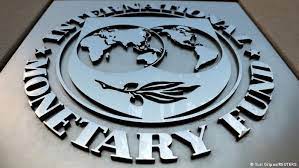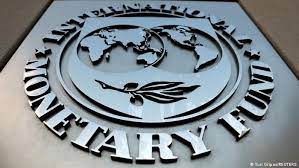
According to a top IMF official, the extraordinary financial sanctions imposed on Russia following its invasion of Ukraine threaten to erode the US dollar's dominance over time, resulting in a more fragmented international monetary system.
The IMF's first deputy managing director, Gita Gopinath, believes that the sweeping measures imposed by western countries in response to Russia's invasion, such as restrictions on its central bank, may encourage the emergence of small currency blocs based on trade between separate groups of countries.
“The dollar would remain the major global currency even in that landscape but fragmentation at a smaller level is certainly quite possible,” she said in an interview with the Financial Times. “We are already seeing that with some countries renegotiating the currency in which they get paid for trade.”
Russia has been working for years to minimise its reliance on the dollar, a strategy that picked up steam when the United States imposed sanctions in response to its annexation of Crimea in 2014.
Despite these attempts, Russia had around a fifth of its foreign reserves in dollar-denominated assets right before the invasion, with a significant portion held in Germany, France, the United Kingdom, and Japan. These nations have now joined forces to cut Moscow off from the global banking system.
According to Gopinath, the increased usage of foreign currencies in global trade will diversify the reserve assets held by national central banks.
“Countries tend to accumulate reserves in the currencies with which they trade with the rest of the world, and in which they borrow from the rest of the world, so you might see some slow-moving trends towards other currencies playing a bigger role [in reserve assets],” she said.
In the medium term, she continued, the dollar's dominance — backed by strong and highly credible institutions, deep markets, and the fact that it is freely convertible — was unlikely to be challenged.
With the advent of other trading currencies, led by the Australian dollar, the dollar's proportion in foreign reserves has fallen from 70% to 60% in the last two decades, according to Gopinath.
Greater use of the Chinese yuan can account for around a fourth of the fall in the dollar's share. However, according to IMF figures, Beijing's currency accounts for less than 3% of global central bank reserves.
Beijing was in the process of internationalising the renminbi before the current crisis and is already ahead of other nations in adopting a central bank digital currency, Gopinath said. But she added that the renminbi was unlikely to replace the dollar as the dominant reserve currency.
“That would require having full convertibility of the currency, having open capital markets, and the institutions that can back [them]. That is the slow-moving process that takes time, and the dollar’s dominance will stay for a while,” she said.
She also predicted that the battle would accelerate the adoption of digital money, from cryptocurrencies to stablecoins to central bank digital currencies.
“All of these will get even greater attention following the recent episodes, which draws us to the question of international regulation,” said Gopinath. “There is a gap to be filled there.”
(Source:www.ft.com)
The IMF's first deputy managing director, Gita Gopinath, believes that the sweeping measures imposed by western countries in response to Russia's invasion, such as restrictions on its central bank, may encourage the emergence of small currency blocs based on trade between separate groups of countries.
“The dollar would remain the major global currency even in that landscape but fragmentation at a smaller level is certainly quite possible,” she said in an interview with the Financial Times. “We are already seeing that with some countries renegotiating the currency in which they get paid for trade.”
Russia has been working for years to minimise its reliance on the dollar, a strategy that picked up steam when the United States imposed sanctions in response to its annexation of Crimea in 2014.
Despite these attempts, Russia had around a fifth of its foreign reserves in dollar-denominated assets right before the invasion, with a significant portion held in Germany, France, the United Kingdom, and Japan. These nations have now joined forces to cut Moscow off from the global banking system.
According to Gopinath, the increased usage of foreign currencies in global trade will diversify the reserve assets held by national central banks.
“Countries tend to accumulate reserves in the currencies with which they trade with the rest of the world, and in which they borrow from the rest of the world, so you might see some slow-moving trends towards other currencies playing a bigger role [in reserve assets],” she said.
In the medium term, she continued, the dollar's dominance — backed by strong and highly credible institutions, deep markets, and the fact that it is freely convertible — was unlikely to be challenged.
With the advent of other trading currencies, led by the Australian dollar, the dollar's proportion in foreign reserves has fallen from 70% to 60% in the last two decades, according to Gopinath.
Greater use of the Chinese yuan can account for around a fourth of the fall in the dollar's share. However, according to IMF figures, Beijing's currency accounts for less than 3% of global central bank reserves.
Beijing was in the process of internationalising the renminbi before the current crisis and is already ahead of other nations in adopting a central bank digital currency, Gopinath said. But she added that the renminbi was unlikely to replace the dollar as the dominant reserve currency.
“That would require having full convertibility of the currency, having open capital markets, and the institutions that can back [them]. That is the slow-moving process that takes time, and the dollar’s dominance will stay for a while,” she said.
She also predicted that the battle would accelerate the adoption of digital money, from cryptocurrencies to stablecoins to central bank digital currencies.
“All of these will get even greater attention following the recent episodes, which draws us to the question of international regulation,” said Gopinath. “There is a gap to be filled there.”
(Source:www.ft.com)





